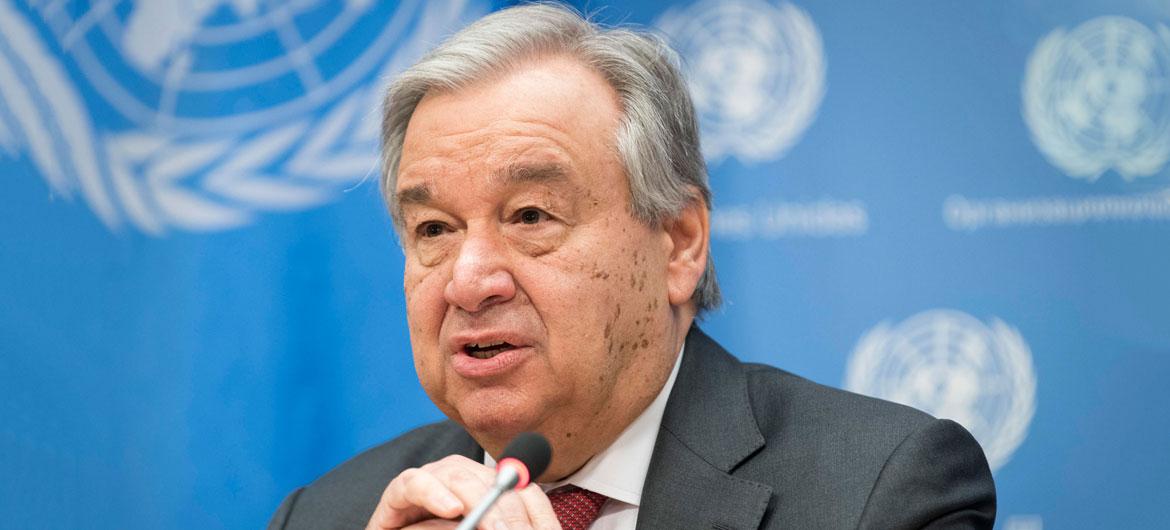'Humanity is preparing its own end by going to war with nature,' he says: Who is Antonio Guterres?
Could the UN Secretary-General, who said, "Nature always takes its revenge, and does it with anger, with violence", succeed in ending the occupation of Russia? Is there still a chance to succeed?

Antonio Guterres is the Prime Minister of Portugal from 1995-2002, the UN High Commissioner for Refugees from 2005-2015 and the 9th Secretary-General of the United Nations since 1 January 2017.
- Born: April 30, 1949- Lisbon (Portugal)
- Languages Known: Portuguese, French, English, Spanish
EDUCATION LIFE
He received his high school education at the prestigious Camoes school. He received his undergraduate education at Instituto Superior Tecnico and graduated as an engineer in 1971.
Before starting his political life, he continued his academic career as an assistant professor for a while.
PERSONAL LIFE
He married Luisa Amelia Guimaraes e Melo, a child psychologist, in 1972. The couple had two children from this marriage. His wife, who was a cancer patient, died in 1998.
He married his second wife, Catarina Marques de Almeida Vaz Pint, in 2001.
POLITICAL LIFE
Antonio Guterres started his political life in Portugal in 1974 with the Socialist Party. After this date, Guterres, who ended his academic career, went into politics.
In the late 1970s, he was part of the team that negotiated the terms of Portugal's entry into the European Union.
In 1991, he established the Portuguese Refugee Council.
The election defeat of the Socialist Party in 1992 made Antonio Guterres the leader of the party and also became the leader of the main opposition.
After the Socialist Party won the elections in 1995, “President Soares Antonio” Guterres was appointed Prime Minister.
After being elected Prime Minister;
- Budget expenditures
- Portugal to meet the Euro criteria within the next ten years,
- Increasing the participation of women in the labor market, in particular,
- He worked on issues such as improving the collection of taxes and preventing tax evasion.
Antonio Guterres worked in a very different style from his predecessor in the early years of his term, establishing a controversial dialogue with all segments of society, making him a popular prime minister.
In the 1999 elections, Guterres' party, the Socialist Party, and the opposition were able to get the same number of deputies.
Guterres was re-appointed, as prime minister. However, Guterres' second term will not be as successful as the first. Reasons such as intra-party conflicts and the slowdown in economic growth damaged Guterres's popularity.
The local elections held in December 2001 resulted in a major defeat for the Socialist Party. After this defeat, Antonio Guterres resigned.
UNITED NATIONS HIGH COMMISSIONER FOR REFUGEES (UNHCR)
In May 2005, he was appointed as the High Commissioner for Refugees by the UN General Assembly.
By directing the organization during his tenure, he provided protection and assistance to more than 60 million refugees, displaced persons, and stateless persons with more than 10,000 employees in 126 countries at the end of his tenure.
In the last years of his tenure as High Commissioner, he worked to provide international assistance to refugees fleeing the Syrian Civil War. In his speeches, he emphasized that European countries should bring a more humane approach to the refugee crisis in the Mediterranean.
In 2012, Antonio Guterres appointed Angelina Jolie as his "special envoy" to represent UNHCR and himself at the diplomatic level. Together they visited refugee camps in Turkey and Jordan.
He left his post as United Nations High Commissioner for Refugees on 31 December 2015.
UNITED NATIONS SECRETARIAT GENERAL
On 29 February 2016, he submitted his candidacy as Portugal's candidate for the UN Secretary-General election.
On 6 October 2016, the UN Security Council accepted Guterres' candidacy and officially announced his candidacy. A week later, he was elected as Secretary General by the United Nations General Assembly.
Antonio Guterres took over the post of Secretary General from Ban-Ki moon, whose term of office expired on 31 December 2016, and became the UN Secretary-General as of 1 January 2017.
Guterres will continue his post as UN Secretary-General for 5 years unless he extends it.
Ban Ki-moon, who served as the Secretary-General for the previous term, stated in his speech following the unanimous decision of the 193-member General Assembly that Guterres "was in war and conflict zones and refugee camps within the scope of his previous duty, and he directly witnessed the suffering of people," He stated that he always benefited from his advice and that the election of Guterres was a very good choice for the UN”.
